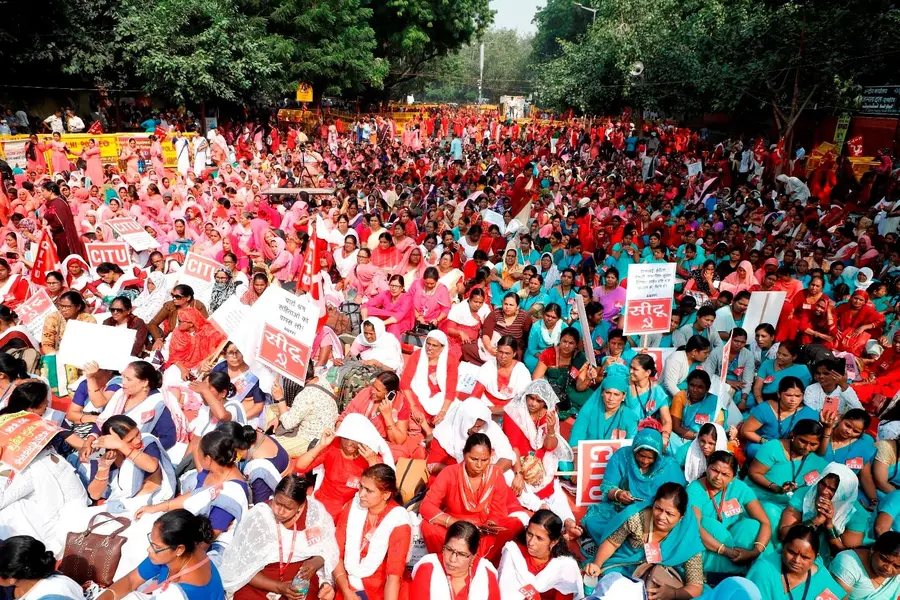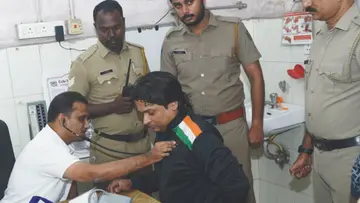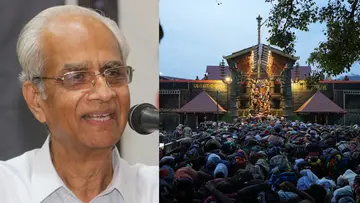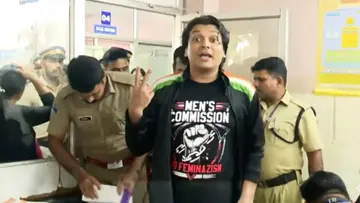Labour
ASHA Workers’ Struggles: Fighting for Pension and Job Security

ASHA Workers' Protest in Jantar-Mantar, New Delhi (Picture Courtesy: CITU)

Anjali Ganga
Published on Feb 20, 2025, 10:38 AM | 4 min read
All said and done, but the condition of ASHA workers in India remains dire. Timely payments and increased honorariums continue to be a distant dream in most states. "Which family can survive on a mere ₹3,000 per month? This is the only 'salary' the central government has provided ASHA workers for years. It is only due to the Left Democratic Front (LDF) government that there has been a consistent increase in the state's share of the honorarium in Kerala," says Bindu, an active ASHA worker in Thiruvananthapuram.
The ASHA Workers and Facilitators Federation of India (AWFFI) has been pressuring the Union government to increase financial allocations for the National Rural Health Mission (NRHM) and to regularize thousands of ASHA workers and facilitators as government employees with all statutory benefits.
Nationwide protests, including in Kerala, have been ongoing to highlight these demands. A recent protest in New Delhi by AWFFI emphasized the need for minimum wages, social security, and pensions, as recommended by the 45th and 46th Indian Labour Conferences (ILC), and to make the NRHM a permanent wing of the government.
The incentive-based salary system has been widely criticized for placing an additional burden on ASHA workers, who are already fulfilling numerous central government policies without adequate compensation. This creates a toxic work culture, forcing ASHAs to choose between meeting incentive targets and completing newly assigned tasks.
"In most states, ASHAs receive performance-based incentives, but in Kerala, ASHA workers can earn up to 13,200 rupees per month, including telephone allowances," says Bindu. While the central government provides a base incentive of 3,000 rupees, the Kerala state government contributes an additional 7,000 rupees as honorarium.
"Before 2016, we received only 1,000 rupees as a monthly honorarium from the state. When the LDF government came to power, the honorarium gradually increased to 7,000 rupees. Most recently, in December 2023, the LDF government raised the state share by 1,000 rupees. This increase helped my family survive financially during the tough times of the COVID-19 pandemic," Bindu added.
In addition to the 7,000 rupees honorarium, the central and state governments jointly provide a fixed monthly incentive of 3,000 rupees, distributed in a 60:40 ratio. ASHA workers can also earn up to 3,000 rupees in additional incentives based on the services they provide under various schemes, along with a monthly telephone allowance of 200 rupees. In total, diligent workers can earn up to 13,200 rupees per month. These payments are directly credited to their accounts through the ASHA software.
During the 2023-24 financial year, despite delays in receiving the central share, the LDF government in Kerala ensured timely distribution of incentives using state funds. The Kerala government has also requested the central government to increase incentives for ASHA workers, and a favorable decision is expected.
Special Cancer Screening for ASHA Workers and Anganwadi Staff
As part of the cancer prevention campaign "Arogyam Anandam – Akattam Arbudam,"Health Minister Veena George announced special cancer screenings for all ASHA workers and Anganwadi staff across the state. The first phase of screening took place on February 17 and 18. Medical officers organized special cancer screening clinics within their jurisdictions, offering free primary examinations.
Medical officers have also been directed to conduct cancer awareness classes for Kudumbashree units in their respective panchayats. The Health Department has planned year-long activities under this campaign, with the initial phase focusing on women. The screenings primarily target cancers that predominantly affect women, such as breast and cervical cancer, along with other types of cancer. Screening facilities are available at all government health institutions and selected private hospitals.
So far, approximately 1.40 lakh people have participated in the cancer screening program. Arrangements have been made for screenings at 1,328 government hospitals across the state. Of those screened, 6,386 individuals were referred for further testing due to suspected cancer. Those confirmed to have cancer will receive treatment and follow-up care.
While Kerala’s efforts to support its ASHA workers through honorarium increases and health initiatives are commendable, the ongoing struggles highlight that state-level measures alone are insufficient. The Union government must step in with a nationwide framework that guarantees fair compensation, job security, and better working conditions for ASHA workers across India. Only with strong federal support can the systemic issues be fully addressed, ensuring that these crucial healthcare providers receive the recognition and support they rightfully deserve.










0 comments